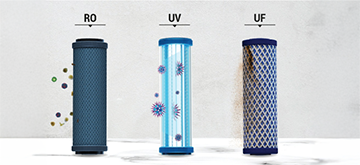
Comparing RO, UV, and UF Water Purifiers: How Do They Differ?
PUBLISHED ON: 23-Nov-2023
Investing in a reliable water purifier is crucial. It ensures pure and safe drinking water through purification methods like Reverse Osmosis (RO), Ultraviolet (UV), and Ultrafiltration (UF).
Primarily, there are three main types of water purifiers: Reverse Osmosis (RO) water purifier, Ultraviolet (UV) water purifier, and Ultrafiltration (UF) water purifiers. Opting for either of these technologies or even a combined RO and UV water purifier warrants careful consideration, as each technology varies in its approach to rendering water safe for consumption.
Let's take a closer look at these technologies so you can make an informed decision.
What is an RO water purifier?
Reverse Osmosis (RO) is a water purification process that uses a semi-permeable membrane to remove TDS from water. In this process, water is pushed through the membrane under pressure, allowing only water molecules to pass through while blocking larger particles, ions, and molecules.
The water is passed through the sediment filter, carbon filter and RO membrane, which retains the natural minerals and nutrients while eliminating harmful contaminants. RO water purifier is an ideal choice for areas that have hard, brackish and salty water. This procedure gets rid of dissolved solids and converts hard water into soft water, thereby making it fit for consumption.
What is a UV Water purifier?
A UV water purifier is a type of purification process that uses ultraviolet (UV) light to disinfect and sterilize water by killing harmful microorganisms. UV purification is a chemical-free process and easy to maintain. The water is forced through a tube and then exposed to radiation. UV water purifiers are particularly effective in treating water containing microbes and do not remove TDS.
UV filters are often used as a final step in water treatment systems to ensure the removal of any remaining microorganisms that may have survived previous filtration stages.
What is a UF water purifier?
UF is a physical filtration process that operates on a molecular level, allowing water to pass through the membrane while blocking larger contaminants. It uses a fine membrane to separate and remove particles, microorganisms, and suspended solids from water. It provides an additional layer of protection beyond traditional sediment filters by targeting particles at a much smaller scale but does not remove dissolved salts, minerals, or chemical contaminants from water.
One advantage is that UF purifiers don't require electricity or chemical additives. UF water purifiers can be useful for areas with microbiological contamination, where the primary concern is the removal of harmful microorganisms that can cause waterborne diseases.
Difference between RO, UV and UF water purifiers
Here's a comparison table highlighting the differences between RO, UV, and UF water purifiers.
Sr. No | UF filter | RO filter | UV filter |
1 | Works without electricity | Needs electricity | Needs electricity |
2 | Kills & Filters all microorganisms | Kills & Filters all microorganisms | Kills all microorganisms but cannot filter |
3 | Can work with Normal tap water speed | Needs electricity to boost the speed of tap water | Works with normal tap water speed |
4 | Cannot remove any dissolved solids or metals | Can remove all dissolved solids, salts and metals | Cannot remove any dissolved solids or metals |
5 | Removes all suspended and visible impurities | Removes all suspended and visible impurities | Does not remove any suspended and visible impurities |
6 | Membrane size is 0.01 Micron | Membrane Size is 0.0001 Micron | No membrane |
7 | Suitable for water with TDS level below 300ppm | Suitable for water with TDS level above 300ppm | Suitable for water with TDS level below 300ppm |
RO, UV, and UF Water Purifier for TDS- Which is Better?
Total Dissolved Solids (TDS) represent a mixture of pollutants, including industrial waste and pesticides, found in water. Minimising TDS is crucial as it can lead to serious health hazards, which is only possible with an RO purifier.
Other microorganisms besides TDS can be other microorganisms present in the water source, which needs a UV or UF filter. This is why having RO water purifiers with inbuilt UV & UF technologies becomes a prudent choice, especially in areas where you are not sure about the TDS levels and other water contaminants.
In a Nutshell
Choosing the right water purifier depends entirely on the quality of your water source and the specific contaminants you need to address. It's also common to find water purifiers with two or more of these technologies for comprehensive water treatment.
Aquguard water purifiers come with these advanced water purification technologies. Additionally, they are equipped with Active Copper and Zinc Booster Technology that infuses the right amount of copper, zinc, and other minerals into the water, Biotron Technology that aids in faster absorption of these minerals into your body, and Advanced Taste Adjuster that provides you with sweet-tasting and odourless water.
